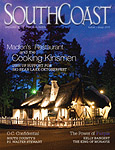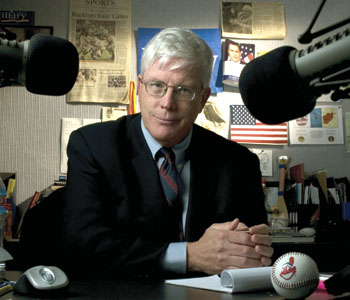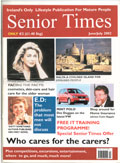Author Archives: Richard Emmons
Author Archives: Richard Emmons

Your city probably has one or more high-gloss magazines targeting the affluent people in your region. Should you advertise in your region’s magazine? First, you must confirm that the readership of the magazine matches the demographics of your targeted clientele. Does the typical reader sound like someone you’d like to have sit across your desk?
One such magazine in Southern California is South Coast magazine, self-described as the “magazine of the California Riviera.” The magazine states “South Coast readers live in households with a median property value of approximately $950,000 with a median age of 41.5, and a median income of approximately $164,000. Our readers are predominately young, affluent, active, educated, well-traveled professionals, who seek challenge in their lives.”
Home value and income levels are high yet the median age is 41.5. Wonderful if you target professionals. Not so great if you target retirees needing estate planning.
The advantage of magazine ads over newspaper advertising is that magazines often will sit around for a month or two before being tossed in the trash. Newspapers come daily and are quickly tossed. These high-gloss magazines are designed to look good sitting on your coffee table. Which increases the chances of your ad being seen.
This advantage becomes a disadvantage if your ad is a dud. You’ll need to live with your ad for a whole month before you can tweak the headline or change the name of the free report.
What should your ad say? Resist the temptation to create a glitzy image ad showing how wonderful you are. Your ad should offer something of real value to get readers to contact your office. You need their contact information so you can follow-up with them later with your newsletter or e-zine. You could offer a free report on retirement planning pitfalls or an invitation to an upcoming community seminar.
Should you try a one-time test? Someone once said the most popular form of gambling for small businesses is advertising. This is especially true of magazine advertising. Don’t expect to make a big splash with a big full-page ad run one-time. Even a proven ad in a new publication may need time to work. For monthly magazines budget for 3 months and a weekly magazine budget for 4 weeks minimum to give the ad a fair test. Far better to run a quarter-page ad 3 times than a full-page ad just once.
What size ad should you start with? Many magazines have active classified sections in the back of the magazine. You can start with a small classified ad offering a free report. The ad won’t cost much and can easily pay for itself. Gradually increase the size of the ad as long as the ad is paying for itself. You can add a bigger headline and a splash of color to a small display ad to get more attention. Go to a quarter page ad and keep tracking the results. A half-page ad may pull better than a full-page ad. You won’t know if you don’t track the results.
Who should design your ad? Be careful if the magazine offers to design your ad at no cost. The graphic designers probably aren’t skilled in copywriting. Plus they have a tendency to try to design a beautiful ad versus an effective ad. You don’t want to win a design award…you want to win new clients. You want the ad to pay for itself.
Want to get free advertising? Take a look at the magazine and see if they have a financial columnist or not. Offer to write a monthly column in exchange for some display advertising. How much advertising should you ask for? Let’s assume that your hourly rate is $175 per hour and it takes you an average of 3 hours to write an article. You value your articles at $500 each so ask for twice that in free advertising in lieu of payment. If $1000 buys a quarter page ad, you could do a half-page ad every other month.
Magazine ads should be considered when you know the magazine’s readers match your targeted niche, you have proven ads with tested headlines and offers, and you have the budget to test an ad for several issues in a row.

Getting a local radio show is a great way to get known in your community as a financial planning expert. Let’s look at the “6 C’s” of having your own radio show:
Contact. A radio show gets you in contact with hundreds or thousands of prospective clients all at once. You build chemistry, establish yourself as an expert and as brave. Not many folks would like to be put on the spot every day or every week. Your clients will enjoy hearing you on the radio and will brag on you so you’ll get more referrals.
Content. Now you’ve gotten a radio show. So what do you talk about? You could do a series of topical shows on various investing and planning areas. You could do a few shows on explaining common investment jargon. You could answer listeners’ questions. The questions could be sent in by email, folks could call your office with questions or you could take them live on air. What do you do if someone asks you a question you can’t answer? No problem, just say, “Great question. Let me do a bit of research and come back tomorrow with a complete answer.” Listeners will appreciate that you admit you don’t know it all. Live Q&A is best and you can do it after you’ve done several shows.
Counsel. You need to give general advice only. You can’t give specific advice because you don’t have the facts of their personal situation. This is a good reason for them to visit you in your office. You also need to be careful not to provide tax or legal advice. Share some air time with your lawyer and CPA and you might see some more referrals down the road.
Controversy. Be especially careful when a listener asks a political question. Your opinion might alienate half your audience. Remember most elections are decided 51% to 49%. Many listeners (and potential clients) will be adamantly opposed to socialism while equally adamant against any cuts to Social Security or Medicare! Emphasize personal responsibility and not wanting to be dependent on the government in your old age. You can take stronger positions when it comes to financial planning matters. Why? Because you are an expert and should know certain planning approaches are better for “most people.” Example, “For most people who own their own home and have over 100,000 in financial assets, estate planning with a living trust is a better option than relying upon a will.”
Cost. Small towns have smaller audiences so the cost is less. One advisor I help pays $1000 per month for a 15 minute Financial Forum show every business day. Another advisor pays $250 per hour for a one-hour weekly show in a big city. In both cases, they get some advertising spots and can cross-promote their seminars and other events.
Communication. You must learn to be clear, concise, and confident when you talk on the radio. Speak in plain English or people will tune you out! And toss in a bit of humor to be more likable and approachable. Imagine you’re speaking to just one person and you’ll be more effective (and less nervous).
How do you get started? Talk to your best clients and find out which radio stations they listen to. Contact these stations and speak with the station manager about starting your own radio show. Whether you do a 3-minute “Money Matters” or a 15-minute or one-hour “Financial Forum”, you can use radio to build chemistry and trust with thousands of people while establishing yourself as an expert in your field.
UPDATE: My friend Burke Allen has over 20 years in PR and the radio industry. He put together a program called Get Your Own Radio Show to help individuals get started in radio.

This Wall Street Journal article points out that many Regional Broker/Dealers are raising minimum production amounts. If you’re feeling some heat from your broker/dealer, you have two choices. Improve your marketing to raise your production…or fire your BD! After the article you can find ideas on both of these choices.
Regionals Raise Broker Production Minimums
By Kristen McNamara
The barrier to entry for would-be brokers at some regional firms is getting higher. And brokers already working at those firms are finding they have higher hurdles to clear, too.Financial advisers who move to regional broker-dealers from large Wall Street institutions often generate more in fees and commissions than regional incumbents. Some of these new arrivals want to work at smaller organizations while others are pushed out by wirehouses which are trying to shed what are, for them, lower producers.
The amount of client money wirehouse brokers oversee, and their corresponding pay, is generally much higher than that of the regional brokers. That means low-producing wirehouse brokers can still generate more revenue than the average regional broker.
The average amount of money overseen by a wirehouse broker was $71.9 million at the end of 2008, according to research and consulting firm Cerulli Associates’s most recent data. That’s more than double $31.9 million in average assets per regional financial adviser, according to Cerulli.
The number of brokers migrating to regionals from wirehouses jumped between late 2008 and the first half of 2009. Several Wall Street giants that merged focused on keeping their biggest brokers — generally those producing at least $500,000 a year — by offering them big retention bonuses, while discouraging lower producers from staying with pay cuts.
While the movement of wirehouse brokers to regional firms has slowed considerably in recent months, the influx of wirehouse brokers prompted some regional firms to begin raising production requirement for employees and recruits.
Janney Montgomery Scott, for example, increased last year its minimums for prospective hires to $500,000 in annual fees and commissions and $60 million in assets under management. That’s above the firm’s average production now, which is approaching $450,000.
It also raised to $200,000 from $150,000 the minimum brokers must generate each year or have their payout reduced. It expects to gradually move that minimum higher.
The relatively small size of regional brokerages compared with wirehouses fosters a more collegial culture, according to consultants and recruiters.
“Regionals are certainly looking to raise average production,” says Mindy Diamond, president of executive search firm Diamond Consultants. “At the end of the day, they’ll do it differently” than wirehouses.
Beginning next year, Edward Jones will raise its production requirements for the first time in more than a decade. Brokers who have been with the firm for more than 10 years will need to generate at least $30,000 a month in fees and commissions, and $32,000 if they’ve been with the firm 12 or more years. That compares with a requirement of $27,000 for eight-year veterans today.
The firm says it’s giving brokers plenty of advance notice and has improvement plans to help struggling brokers. Still, those who don’t improve within months may be fired.
“Regional firms don’t have the same level of ruthlessness as large wirehouses,” says Mark Elzweig, founder of executive search firm Mark Elzweig Co.
“Don’t have the same level of ruthlessness….” That’s comforting…not!
An old USP for Federal Express was “Don’t panic. Call Federal Express!” Likewise, if you’re below minimum production numbers for your broker/dealer you need to take action now but you don’t need to panic.
What should you do? You should click the “Productivity” link above and implement enough ideas to free up some time to invest in your marketing activities. You also need to free up some cash so you can invest some money in your marketing activities.
You need high return without high risk marketing ideas because you must grow your practice this year. So don’t even consider getting creative and developing your own marketing system. You simply don’t have the time (and probably the money) to create and test advertisements, content, offers, etc.
You need to investigate proven, turn-key, marketing programs designed specifically for financial advisors. Find one you’re comfortable with and go for it! Just resist the temptation to get too creative…when you buy a marketing program you need to stick with the program.
This puts an entirely different spin on this topic. Maybe you’re tired of your BD’s compliance standards and unpredictable approval process. Maybe you’re producing enough for your lifestyle but not enough for your BD’s higher production standard. There are alternatives out there to consider who have lower production minimums.
Contact me and I’ll give you some suggestions. Got a great BD? Add your comments below and let us know all about them.

Feeling neglected is the #1 reason people leave one company for another. Not price. Not service quality No Product features. Everyone wants to feel appreciated and remembered. Hosting an annual client appreciation dinner makes your clients feel appreciated and reminds people why they do business with you.
Client appreciation dinners help you build your practice as well.
FINRA prohibits financial advisors from advertising a list of clients or using client testimonials. You lose a powerful tool for promoting your practice and proving your expertise. Imagine adding these quotes to your website:
“Bob answers my questions patiently so I always understand what I’m investing in and why.”
“Bob got me out of the stock market 3 weeks before the crash!”
“Bob showed my why working for 2 more years would add 10 more years of retirement income!”
“Bob invests my money for my best benefit and not to maximize his commissions.”
“Since moving my money to Bob, I’ve averaged 17% per year and never had a losing year regardless of the stock market.”
What does this have to do with a client appreciation dinner? Your invitation to your clients should encourage them to bring another couple with them to enjoy the evening. Generally speaking, Someone’s social circle usually include people in a similar economic situation. People who live in expensive neighborhoods have neighbors who need a qualified financial advisor. Like you.
During the event you allow a time for people to say nice things about you. You tell a few close clients about this ahead of time so they come prepared to wax eloquent about you. Others will get the idea and you’ll be praised and (perhaps a bit roasted) by people who appreciate what you’ve done for them.
All the prospects will learn about you in a fun, relaxing environment. You leverage your time by building chemistry with lots of folks at the same time.
When should you hold this event? This depends on where you live and who your targeted clientele is. However, there are 2 main times. You can hold a BBQ for families in the Summer or a dinner in December.
You want to make the event nice and worth the time of your clients and their friends. Don’t go cheap on the food or the place because you only have one chance to make a good first impression with your prospective clients.
Consider having a well-know guest speaker for the event. Limit their talk to about 20 minutes maximum because it is a party after all. And encourage your guests to speak with him during the event.
Your event could follow a program like this:
When you hold your client appreciation dinner in December, you thank your clients for their business, make them feel appreciated and connect with their friends and relatives. Do it right and you’ll have a very busy January and February!
In this short video, Richard Emmons discusses why advisors need to get a website today. Even a basic website allows prospects to find you. Can you imagine not being in the telephone book? You can always improve your website later. For now get something up so people can find you. And not your competitors!
For more information on building a website as part of a systematic marketing program, read Marketing Survival Guide.
You can get more folks to your seminar with free bonuses. These bonuses can include autographed copies of your book or a free initial consultation with an estate planning attorney or a tax analysis or a portfolio review. Even the offer of free door prizes can help build attendance.
You’ll be more relaxed and do a better seminar when you use a check off list for your event.
Before your event, make a list of everything you’ll need for your event. This can include items for your literature table such as brochures and business cards. You’ll have equipment like your laptop computer, your pointer, and your projector. How about an extension cord? You’ll also want things near you at the podium such as a glass of water and a pad and paper to take notes.
During your event, jot down items you wish you had so you’ll remember to bring them the next time. After the event, update your list so you’ll be a bit better prepared the next time.

 You build a lot of credibility writing articles for local publications. Many publications are hungry for quality content that their readers will read. When you have this opportunity, you get chance to get in front of hundreds or even thousands of qualified prospects. You demonstrate your expertise and build credibility over time. Plus people can get to know you over time as you blend in personal stories which bring investment and economic principles to life.
You build a lot of credibility writing articles for local publications. Many publications are hungry for quality content that their readers will read. When you have this opportunity, you get chance to get in front of hundreds or even thousands of qualified prospects. You demonstrate your expertise and build credibility over time. Plus people can get to know you over time as you blend in personal stories which bring investment and economic principles to life.
So where should you look? First look at your local newspaper. Depending on the size of your area, your paper may or may not have an investment writer. Is there a financial columnist? If not, call the editor and ask to set up a meeting to discuss the possibility. If there’s already a columnist, do you offer a different perspective? Maybe there’s room for a second columnist who offers a different investment philosophy. Or just focuses on pre-retirees and retirees.
Should you expect to get paid something? Probably not unless it’s a large and successful publication and they can afford it. You don’t really care because you’re getting free advertising in a format with much more credibility than a paid ad.
How should you prepare for meeting the editor? Of course you need to bring in a package of your marketing materials so he can learn a bit about you. You need to have a few columns already so the editor can judge your writing ability.
How should you write? You must write in a lively, engaging, and informative way because a boring column won’t get read. My number one suggestion in this area, is to write the way you talk. Remember you’re writing to individual readers not a classroom. Don’t use industry jargon, help readers understand industry jargon and improve their investment and planning abilities.
So what should you write about? Let’s assume you’ve been asked to write a weekly column. How could you possibly fill 52 weeks of columns? There are lots of ways.
First, you ask your readers to email their questions to you. You answer reader questions every other week to fill 26 weeks. You write a seven-part series on “The 7 Most Common Retirement Planning Mistakes and How To Avoid Them.” This gets you down to 19 weeks left. You write one column per quarter on taxes which gets you down to 15 weeks. One column per month would be an economic and investment update. You only need 3 columns to fill out the year. You could do a column on “Retirement Resolutions” in January, a “Financial Independence” column in July, and a “Back To School” column every September on the importance of saving for your children’s college education. And you’d have 52 opportunities to get in front of prospective clients and build your reputation as knowledgeable, plain-spoken, and down-to-earth.
What if you can’t get a column in your local paper? Look at the various “Senior Times” publications in your area along with regional magazines. Any publication will allow you to promote yourself as the “retirement columnist for the Senior Times.” Over time, you’ll attract new prospects and assure existing clients that you’re an expert in your field.
In this short video, Richard Emmons discusses setting the major goal for your seminars. Not what’s in it for you, but rather what’s in it for your audience. If you give them what they want you’re most likely to get what you want. For more seminar marketing ideas go to http://www.MyLivingTrustSeminar.com.
This past Tax Day, I was interviewed by Jobie Summer, CFP® of Resources For Advisors about the Family Living Trust Seminar system. Her questions included:
You can listen to the interview by going to the Family Living Trust Seminar website.